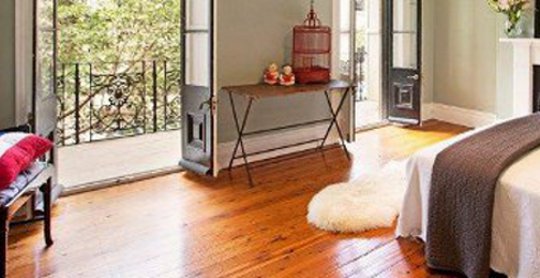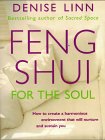
Your home can be your greatest ally in helping you to achieve your potential. This is true because your home is not only a reflection of you, but in its deepest sense, it also has the power to mold you and shape your future. When you implement changes in your home, you will notice that often your life is also transformed: instantly, dramatically, and permanently.
Your home fulfills many functions in your life. On the physical plane, it provides shelter from the elements and offers you protection and privacy. Beyond this, it is also a place where you can relax and be yourself. It can serve as a canvas for your self-expression. Your dwelling is also an outward expression of your inner being, and on a very profound level it is also a place where you can grow spiritually.
In the deepest sense, your personal space is a sharply accurate mirror of your subconscious desires, hopes, fears, and dreams. It reveals your beliefs and decisions about yourself and the world. It is a reflection of your identity.
A Mirror of Yourself
You cannot help but implant your identity on your home. Every object you place in it expresses some inner aspect of yourself. As you mature, your development is mirrored in the choices you make in your environment. The style of your home, your possessions, and the colours you like all reflect your inner being. The Swiss psychoanalyst Carl Jung said that everything in the unconscious seeks an outward manifestation. This principle explains why we continually project our subconscious beliefs and feelings onto our home.
When you want to find out what someone is like, all you need to do is look around his or her home. The spindly teenage boy who plasters his bedroom walls with images of Arnold Schwarzenegger and Sylvester Stallone is subconsciously saying, 'I want to look like a body builder'. The data processor who decorates her home with photos of unspoilt wilderness, carvings from Africa, and an animal print duvet cover on her bed dreams of having some adventure in her life. A house with natural fabrics, hand-carved wooden toys strewn on the floor, and biodegradable laundry soap on the shelf speaks of a belief in living naturally and organically. If you want to discover your subconscious dreams, fears, and beliefs, just look around your own home. You will find them represented in every nook and cranny.
Our homes also chronicle our personal history. Our past experiences form a framework that gives structure and context to our lives. We use the past to define ourselves. Our history is carried into the present through the symbols with which we surround ourselves. Our past is displayed in the photos on our walls and in the objects we treasure. The teapot from your great aunt, the baby blanket from your childhood, and the silver napkin rings from your mother are all physical relics embedded with memories. They all say something about the way you define yourself, based on your interpretation of the past.
An Anchor to the Earth
 Your home can serve as an anchor to the earth and to your roots. Ken Colbung (Nundjan Djiridjaken) the senior male clan leader of the Australian Bibulmum Aboriginal tribe, spoke to me of how important this connection between people and their land can be. He said,
Your home can serve as an anchor to the earth and to your roots. Ken Colbung (Nundjan Djiridjaken) the senior male clan leader of the Australian Bibulmum Aboriginal tribe, spoke to me of how important this connection between people and their land can be. He said,
'Western man is connected materially to the land, but we are connected spiritually to land. It's important that we continue to secure our connection to the land because it is our spiritual embodiment.'
Your home is the connecting point between heaven and earth. It is the place of your centre, your axis -- it connects you to the land.
A Template for Spiritual Growth
The soul is always yearning to expand and grow. This is the reason why we are subconsciously drawn to home environments that can give us what we need at a particular point in time. The homes we choose often provide what we most need to progress on our journey towards wholeness. Some of these environments may seem to lack harmony or even have unpleasant aspects, but they always offer us an opportunity to grow.
Just as we are drawn to individuals and experiences that contribute to our spiritual growth, so too we may seek environments that can help us to learn the lessons that we need in life. The Dalai Lama once remarked that you don't learn tolerance from your friends. What this means is that it is sometimes the people you find the most disagreeable who have the most to teach you. This is true with our homes as well.
Your soul is drawn to what it needs. In traditional feng shui, a home at the top of the mountain is usually considered bad feng shui because it is too exposed. The bottom of a valley is also inauspicious feng shui because it can be too cloistered and constricted. However, living on top of a mountain may suit your soul because the vast open expanses make you feel more expansive . . . and this is what your soul needs. And other people, living down in the valley, may find this environment perfectly meets their requirements for seclusion: its constrictions might help them to focus their otherwise somewhat frenetic energy.
There are no wrong homes. Each home offers you unique opportunities for spiritual growth. The so-called feng shui imperfections of your home may well be exactly what you need for polishing the rough edges of your soul. For example, a man I once knew lived in a rented home that had a very low entrance door. This is usually considered bad feng shui. Henry was a tall man, and every time he entered his house he had to incline his head. Sometimes he would be in a hurry and forget to do this. He would then hit his head on the door lintel which made him angry. Sometimes he yelled at the door. Occasionally he banged his fists on it. One day he came home, looked thoughtfully at the door lintel, humbly bent his head and walked in. It was a moment of truth, a moment that changed his life.
Henry was often in confrontational situations. Many people found him arrogant, because he was always trying to prove that his point of view was right. The instant he bent his head at his threshold, he was filled with an indescribable peace. In that moment, he realised that he could navigate around the obstacles in his life. Afterwards, whenever Henry walked through the front doorway, he bent his head in humility saying to himself, 'I accept my life with love and compassion', and he found more harmony unfolding in his life.
Sometimes problems encountered in feng shui bring to mind the classic question about the chicken and the egg. Which came first? Do we subconsciously choose homes that contain metaphors for the issues that we need to work on? Or do we experience blockages in our fife because of the bad feng shui of the home? Although the answer is probably some of each, I generally feel that we subconsciously choose homes because they have something to teach us. On a soul level, there are no bad homes. Every home is filled with lessons and opportunities for spiritual growth.
Sometimes the soul is drawn to a house because it has energy that will help activate hidden potential. Shortly after my husband and I were married, we moved into a ramshackle little house by the sea. We did not have much money, so I decorated our home with things found in thrift stores and with treasures washed up by the sea. I framed paintings with driftwood, and placed on the windowsill pieces of glass from the shore that looked lovely in the afternoon sun. Our shabby little house began to glow, igniting an incredible creativity within me unlike anything I had ever experienced before. Without the limitations of our income and this tiny home, I might never have discovered this side of myself.
What is Home to You?
 To gain clarity about your home, you must first look at what 'home' means to you. The hidden symbols that you discover within your four walls can be decoded to reveal your overall beliefs about what a home is. This will be slightly different for each person.
To gain clarity about your home, you must first look at what 'home' means to you. The hidden symbols that you discover within your four walls can be decoded to reveal your overall beliefs about what a home is. This will be slightly different for each person.
For many people their home is the place where they sleep every night. Other people may think of home as the place where they were born and grew up, even if they have lived elsewhere for many years. For many native people, home is their ancestral village or the place where their ancestors are buried.
I have spent quite a bit of time in Scandinavia. Many people in these northern countries live in city apartments for most of the year, but for a month or more during the summer they go to a cottage by a lake. Often this will be the place they call home. Their definition of home is not determined by the amount of time they spend there, but the amount of happiness they feel in a place.
Some people's sense of home will be linked to a certain kind of geography, such as the moors of Scotland, the lakes of Sweden, the mountains of Switzerland, or the great plains in the middle of the United States. Whenever these individuals find themselves in this kind of terrain, they feel at home. It is useful to ask yourself, 'Where do I feel at home?' When you have discovered just what the word home means to you, then you can begin to create the kind of environment that has this sort of energy in it.
I once had a feng shui client, named John, who was a perfect example of how this process can work. When he considered what the idea of home meant to him, John realized that he felt most at home whenever he was in the mountains. I suggested that he place paintings and photos of mountains within his home and office to help create the feeling of mountains in his space. He reported that after doing this he felt much more at home with himself and his life.
For some people, ideas of home can be tied to the traditions, heritage or religion of a particular culture. They feel at home when they are surrounded by things that symbolize these associations for them. For example, one of my clients found that he felt at home in environments filled with things from the Japanese culture. He wasn't Asian and hadn't grown up in an Asian culture, but none the less he found that including Japanese objects in his home filled him with a great sense of peace and contentment. Another client found that she felt truly at home among relics and icons reflecting Spanish Catholicism. She said that she felt serene after placing antique carved statues of Jesus and various saints around her home.
These yearnings to be surrounded by objects from a particular culture may be the product of early childhood experiences, ancestral memories, the collective unconscious, symbolic associations, or even former-life memories. Discovering the reason for the attraction is not always important. What does matter, however, is honoring the preferences of the soul. Something that may seem trivial, illogical, or even somewhat silly to the conscious mind often fills a deep need on an unconscious level. Listen to the promptings of your soul. It will lead you home.
©1999/2000, by Denise Linn.
Reprinted with permission of the publisher,
Hay House, Inc. www.hayhouse.com.
Article Source:
Feng Shui for the Soul: How to create a harmonious environment that will nurture and sustain you
by Denise Linn.
Written by a Feng Shui expert, this book shows how to create environments of harmony, spiritual balance and great beauty. It explains how to develop your intuition to understand the deeper meaning of your home. It also presents little-known information on how to activate the dynamic forces of nature within your home.
Click here for more info and/or to order this book:
https://www.amazon.com/exec/obidos/ASIN/1561707317/innerselfcom
About The Author
 Denise Linn is an international lecturer, healer, and author at the forefront of the Feng Shui movement in the U.S.,. Europe, and Australia. She is the acknowledged pioneer of the Space Clearing movement that has gained so much popularity throughout the world. Her bestselling book, Sacred Space, has been translated into 12 languages. She is the originator of the groundbreaking Interior Alignment™ Feng Shui and Space Clearing system, and founder of the Interior Alignment™ Institute, which offers a professional certification course and weekend workshops. Visit her website at www.deniselinn.com
Denise Linn is an international lecturer, healer, and author at the forefront of the Feng Shui movement in the U.S.,. Europe, and Australia. She is the acknowledged pioneer of the Space Clearing movement that has gained so much popularity throughout the world. Her bestselling book, Sacred Space, has been translated into 12 languages. She is the originator of the groundbreaking Interior Alignment™ Feng Shui and Space Clearing system, and founder of the Interior Alignment™ Institute, which offers a professional certification course and weekend workshops. Visit her website at www.deniselinn.com
Watch a video: Denise Linn on Healthy Home
Books by this Author
at InnerSelf Market and Amazon






























